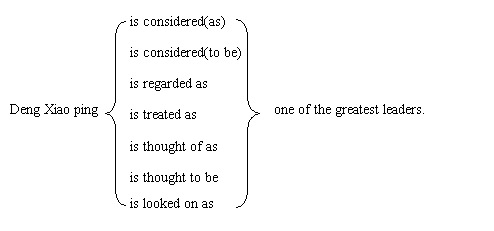1.consider vt. 考虑;照顾;认为
用法:只接名词、代词或动名词及其从句。不可接动词原形及动词不定式。例如:
I am considering going to Shanghai this summer.
我正在考虑今年夏天去上海的事。 (consider +doing)
We consider that he is not to blame.
我们认为这事不该怪他。(consider+ that-clause)
We consider it necessary to do the job.
我们认为有必要做这项工作。(consider +it形式宾语+宾语补足语+动词不定式.)
We consider Mary as one of my best friends.
我认为玛丽是我最好的朋友之一。(consider…as… 把……看作为)
也可说:I consider Mary to be one of my best friends.(consider…to be … 认为……是)
或者:I consider Mary one of my best friends.(consider sth./sb.+ n./adj.)
拓展:consider…as …相当于:regard…as… , treat…as…, think of …as…, look on…as…
例如:邓小平被认为是最伟大的领袖之一。

固定词组:all things considered 从全面考虑,考虑到所有情况
all things considered相当于taking everything into consideration
(n.)
例如:
—The ground was muddy, and she hadn’t run for a month.
—Yes, her speed was really quite good, all things considered.
—地上泥泞不堪,而且她已有一个月没有跑了。
—不错,考虑到各种因素,她的速度已相当不错。
注意:
①consider只接动名词形式,但可以接“疑问词+不定式短语”。例如:
He is considering when to go to the south.
他在考虑什么时候去南方。(consider+疑问词+不定式)
②被动语态时,consider后接不定式。例如:
He is considered to have invented the computer.
人们认为他发明了电脑。(be considered to do sth )
2.means n.手段;方法
means单复数同形。根据句子意思来判断其单复数,从而确定谓语动词的单复数。例如:
The quickest means of travel is by plane.
最快的交通工具是飞机。
All the possible means have been tried.
已采取了所有的手段。
means的相关搭配:
(1)by means of 应用,使用,相当于with the help of.例如:
We expressed our thoughts by means of words.
我们用词句来表达思想。
They made their fortune by means of working hand.
他们靠勤劳发家致富。
(2)by no means一点也不,相当于not at all.例如:
I am by no means pleased with this behaviour.
我对这行为毫不感到高兴。(not at all)
(3)by this/that…means凭(用)这/那个方法/手段,相当于in this/ that…way. 例如:
You can do it by this means.
你可以用这种方法做。(in this way)
3.experiencevt.& n.体验;经历;经验
I experienced great difficulty in getting a visa to leave the country.
我申请出国签证经历了很大的困难。(动词,意为“经历”)
Our country has experienced great changes in the last 30 years.
在过去三十年里,我们国家经历了巨大的变化。(动词,意为“经历”)
How many years' experience do you have of teaching English?
你教英语有多少年(经验)?(作“经验”讲,experience是不可数名词)
Our journey by camel was quite an experience.
我们骑骆驼旅行真是一次难忘的经历。(作“经历”讲,experience是可数名词)
拓展:
experienced adj.意为“有经验的”。例如:
This old man is an experienced worker.
这位老人是一位有经验的工人。
He is less experienced in writing than in teaching.
他写作经验没有教学经验丰富。(be experienced in在……有经验)
4.simply adv. 简单地;简易地;朴素地;清楚地;仅仅;只不过
On her small income they live very simply.
他们靠微薄的收入过着非常简朴的生活。
I don't like driving, I do it simply because I have to get to work each day.
我不喜欢开车,而我之所以开车只是因为我每天必须到工作地点上班。
5.separate
(1)vt. & vi.分开;隔离(become disconnected), 一般与介词from/into连用。例如:
English is separated from France by the English Channel.
英法两国由英吉利海峡分开。(A be separated from B by …,vt.)
We should never separate from the masses.
我们绝不应该脱离群众。(A separate from B,vi.)
We talked until midnight and then separated.
我们谈到午夜时分手。(分手vi.)
An orange can separate into 10 or 12 pieces.
一个橘子可以分成十至十二片。(separate into…)
相当于:We can separate an orange into 10 or 12 pieces.(separate…into…)

separate的宾语侧重于本身是相对独立的成分,如橘子,两个不同的地方(英国,法国)
divide的宾语侧重于本身是不可分割的,而用强制手段把整体割裂、分离开来。例如:
We can divide the big cake into many pieces.
我们能把这块大蛋糕分成很多片。(不可用separate…into…)
We can separate an orange into 10 or 12 pieces.
我们能把一个橘子分成10至12片。(不可用divide…into…)
(2)adj.分离的,分隔的,不同的。例如:
This word has three separate meanings.
这个字有三种不同的意思。(different)
We went our separate ways home from the theatre.
我们从戏院出来各自回家。(各自的)
Keep the onions separate from the bread or they’ll make it smell.
不要把洋葱跟面包放在一起,否则面包会沾上洋葱味道。(keep…separate from使……保持分离)
派生词:separation n.
Tom is unhappy because of his separation from his mother.
汤姆因与母亲分开而闷闷不乐。(separation from…)
6.particular adj.
(1)特别的,不寻常的,值得注意的(special)。例如:
There was nothing in the letter of particular importance.
这封信里没有什么特别重要的内容。
(2)独特的,某一种的(of a certain sort)
I don’t like this particular hat ,but the others are quite nice.
我就是不喜欢这顶帽子,不过其余倒是相当不错的。
(3)考究的,讲究的(showing too much care/interest in small matters)
He is very particular about having his breakfast at exactly 8 o’clock.
他对在八点整进早餐一事非常认真。(一定在八点整吃早餐,be particular about…对……讲究)
(4)难以取悦的,挑剔的(hard to please),多指服装、食品等。
He is very particular about his food.
他对食物非常挑剔。(be particular about…对……非常挑剔)
拓展:in particular特别地=especially=particularly,
I noticed his eyes in particular ,because they were very large.
我特别注意到他的眼睛,因为它们非常大。
He is not particularly clever.
他并不特别聪明。
Watch that horse particularly——it bites!
要特别留意那匹马——它会咬人!
7.vacation n. 假期;休假
They're in Florida on vacation.
他们正在佛罗里达度假。
The library is closed during the college vacation.
学院放假期间,图书馆不开放。

(1)We're going to France during the summer holidays(vacation).
暑假期间我们将去法国。
(2)on holiday(=on vacation)度假
(3)take a holiday(= take a vacation)休假
(4)ask for sick leave 请病假
2.watch out(for)注意;留心
Watch out! There is a car coming.
小心!汽车来了。(相当于be careful)
Watch out for the hole in the road.
留神路上的那个坑。
The staff were asked to watch out for forged banknotes.
已经要求职员留意伪钞。
3.protect sb./sth. from 保护/ 保卫某人(某事物)相当于keep…safe from。例如:
He was wearing dark glasses to protect his eyes from the sun.
他戴墨镜以保护眼睛不受阳光直射。

He raised his arm to protect his face from the blow.
他举起手臂挡住脸部免受拳击。
注意:protect sb./sth. from…的被动语态有两种:
sth./sb. be protected from…或protect sb./sth. from being done(from后的动词与sb./sth.是被动关系),例如:
They built the Great Wall to protect the country from being attacked.
他们修建了长城,以保护国家免受攻击。
They built the Great Wall and the country was protected from attack. (此处attack用作n.)
辨析:protect…from/stop…from/prevent…from/ keep…from
①stop/keep/prevent…from…意思是“阻止……去做……”,动词所接的宾语是要被阻止的对象。而protect…from…中,动词所接的宾语是要被保护的对象。
②被动用法相同。stop/prevent…from…中使用主动语态时,可省略介词from,而词组keep…from…中的from不可省略。但在被动语态中from均不可省略。例如:
He tried his best to stop/prevent her (from)going to the south ,but he failed.
他尽力地去劝阻她去南方,但是他失败了。[stop/prevent sb. (from) doing sth.]
In order to keep her from going out, he locked the door.
为了阻止她外出,他把门锁上了。(keep sb. from doing sth. from不可省略)
4.on the other hand 另一方面(用以引出相互矛盾的观点、意见等,常说on the one hand…on the other hand一方面……另一方面
I know this job of mine isn't well paid, but on the other hand I don't have to work long hours.
我知道这份工作报酬不高,但从另一方面来说,我也不必工作太长时间。
5.as well as 也,还,而且
用法:是一并列连词,可以用来连接句中的并列成分。
(1)连接主语时,谓语动词的单复数决定于as well as前面的名词的单复数。例如:
His parents as well as he treat me very well.
他父母和他对我都很好。(treat与his parents对应)
My brother as well as his friends likes seeing scary films.(like与my brother对应)
我哥哥和他的朋友们喜爱看恐怖电影。
注意:
as well as连接两个成分,可以拆开,例如:上句可改为:
As well as his friends ,my brother likes scary films.
或者:My brother likes scary films as well as his friends.
(2)连接谓语,as well as 与动词连用时,接动名词形式。例如:
She sings as well as playing the piano.
她不仅会弹琴,也会唱歌。(as well as+ doing)
(此句相当于:She can not only plays the piano but also sings.)
提醒:A as well as B重点在A,not only A but also B重点在B
As well as breaking his leg, he hurt his arm.
他胳膊受伤的同时,也折了腿。(as well as+ doing)
(相当于He hurt his arm as well as breaking his leg.)
(3)连接表语,例如:
The child is lively as well as healthy.
这个孩子既健康又活泼。(as well as +adj.)
(4)连接宾语,例如:
He knows German as well as English.
他不仅懂英文,而且还懂德文。
辨析:as well as/as well
as well“也,又“相当于also,too。本身不能作连词,但可以和and 连用。例如:
He speaks English,and Spanish as well.
他既能说英语,也能说西班牙语。(and…as well)
相当于:He speaks Spanish as well as English
或者:As well as English,he speaks Spanish.
或者:He speaks not only English but also Spanish.
I’m going to London and my sister’s coming as well.
我要去伦敦,我妹妹也要去。(too)
1.How would you like to go to the following places, by boat, by air or by bus? 你愿意以什么方式到下面的位置,坐船,乘飞机或坐公共汽车?
how意为“in what way or by what means”,又如:
How can I get to Cambridge?
请告诉我到剑桥该怎么走?
by boat (by air, by bus)等短语中,不能加冠词,若加冠词,则常用in a boat(a plane), on a bus。表“乘坐”的动词是take,如:take a boat (bus, taxi…),但“登机”常用board。
2.Instead of spending your vacation on a bus, in a hotel or sitting on the beach, you may want to try hiking. 你可能想远足,而不是在公共汽车上,在旅馆里或在海滨度过你的假期。
instead of 为介词短语,意为“作为某人(事物)的替换”。
(1)Let's play cards instead of watching television.
咱们玩纸牌吧,别看电视了。
(2)We sometimes eat rice instead of potatoes.
我们有时候吃大米,不吃土豆。
比较:instead adv.代替;更换
It will take days by car, so let's fly instead.
=It will take days by car, so let's fly instead of by car.
开车去要好几天呢,咱们还是坐飞机去吧。
3.(1)Tell someone where you are going and when you will return.
告诉某人你要去哪里,你什么时候返回。
(2)It is done on rivers and streams where the water moves quickly.
那在水流很急的河中或溪流中完成。
(1)句中的where引导状语从句;(2)句中的where为关系副词,引导定语从句。rivers and streams 为先行词,此时where 相当于in which。
4.Eco-tourists want to learn about the world so that they can make it better, or at least understand it better.
生态游客想了解世界以使世界变得更好或至少能较好地理解它。
(1)so that引导目的状语从句,从句中的谓语动词前常带may, might, can, could等情态动词。
We started early so that we could catch the early bus.
我们起早,为了能够赶上早班车。
(2)at least(表程度)至少;起码;无论如何;不管怎样;反正;(表数量)至少(not less than)
The food wasn't good, but at least it was cheap.
这些食品不怎么好,但起码是很便宜的。
He left last Tuesday-at least, I think.
上星期二他离开了,起码我认为他已经走。
It costs at least £5.
它至少值五英镑。
现在进行时表将来的动作,谓语通常为瞬间动词。如:come, go, arrive, leave, start, return, stay, meet, get等。这些动词的进行时后不能再接具体的时间。
(1)用现在进行时表示将来,指的是近期的、按计划或安排要发生的动作。
(2)现在进行时表示将来与表示正在进行的动作的区别在于:前者通常用瞬间动词(有时一些常用动词也可以这样用如:do)如:go, come, start, return, get, arrive等。而后者通常是持续性动词。
He is reading a novel. 他在看小说。
The train is arriving soon. 火车就要进站了。
(3)用现在进行时表示将来的时间,在句中或上下文中通常有表示将来时间的状语。
(4)现在进行时与一般现在时表示将来动作的区别在于:前者表示的将来的动作往往是可以改变的,而后者则是根据规定或时间表预计要发生的动作或事情,因此往往是不可改变或不可随便改变的。
What are you doing next Friday?
下星期五你们打算干什么?
The plane takes off at 7:30 tonight.
飞机今晚七点半起飞。